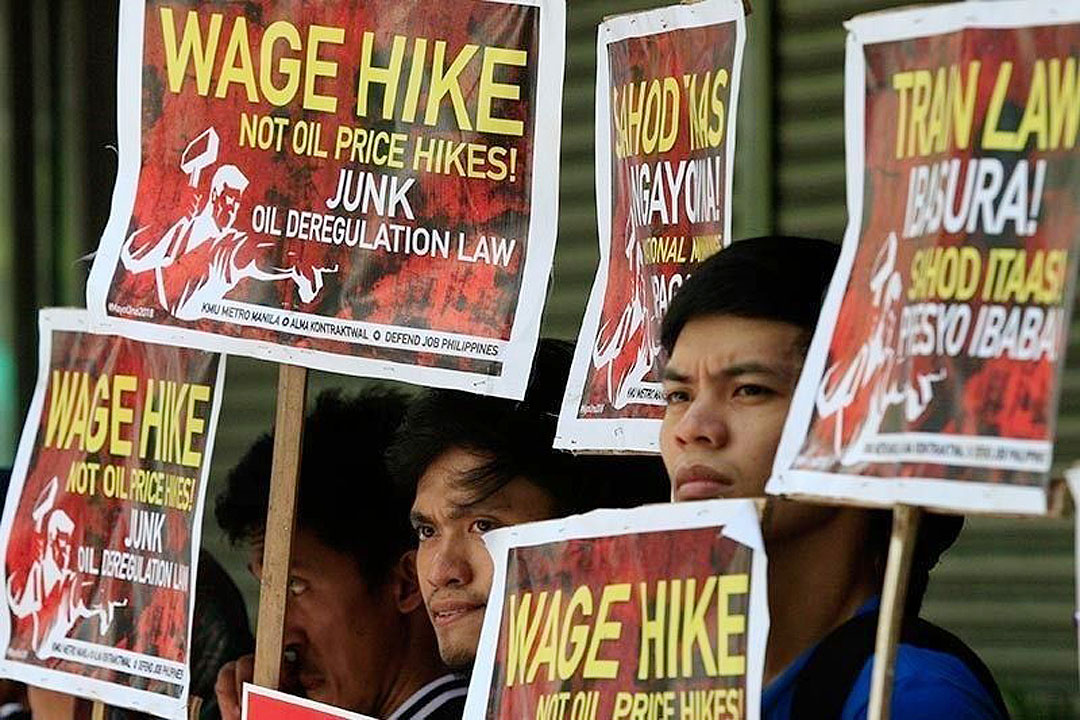
A BILL proposing a wage increase of P750 for all private-sector workers has been filed in the House of Representatives.
The three-person Makabayan Bloc filed House Bill No. 7568, which they said was a necessary response to high inflation.
“This yawning gap between the (average minimum wage and family living wage) of P750 across regions starkly represents the vast sea of unfulfilled basic necessities of ordinary Filipino families, which the National Government should urgently address through substantial wage increases amid historic inflationary surges,” Assistant Minority Leader and Party-list Rep. Arlene D. Brosas, who led the filing of the bill, said in a statement.
The bill was co-authored by Deputy Minority Leader and Party-list Rep. France L. Castro and Party-list Rep. Raoul Danniel A. Manuel.
According to the measure, the wage increase applies to all employees and workers in the private sector, particularly those working in special economic zones and freeports, including those in agriculture.
It also covers workers deployed by licensed job contractors, manpower agencies, and other such organizations.
Calixto V. Chikiamco, president of the Foundation for Economic Freedom, said in a Viber message that “increasing wages will increase demand when supply is short, so these would just trigger more inflation, which would hurt the poor and the overall economy because the Bangko Sentral ng Pilipinas would be forced to increase interest rates.”
He said that a better alternative is to increase workers’ disposable incomes by reducing food prices.
Philippine Chamber of Commerce and Industry President George T. Barcelon said by phone that “the government is doing its part as far as mitigating inflation,” by importing onions and sugar — both of which have led to cartel and price manipulation investigations — to bring down market prices, should “help the public in general as far as cost of living (is concerned,)” Mr. Barcelon said.
The bill also indicated that micro and small enterprises and landowners owning at most five hectares may apply for subsidies until they are able to fully afford the proposed increase. Companies also cannot lay off workers or reduce headcount.
Mr. Chikiamco noted that “subsidies aren’t sustainable nor are they desirable because they don’t increase productivity.”
Mr. Barcelon said the government, labor, and private sector should closely examine any proposed wage increase beforehand.
He added that a legislated wage increase could be negative for exporters. Citing the Philippines’ recent participation in various free-trade agreements, “there will be a lot more imports coming from our neighboring countries and that will kill the manufacturing sector,” Mr. Barcelon said.
National Economic and Development Authority Secretary Arsenio M. Balisacan recently told House legislators that “forcing” wage increase via legislation would damage the Philippines’ competitiveness.
The unemployment rate rose to 4.8% while headline inflation slowed to 8.6% in February.
In a statement, the Trade Union Congress of the Philippines called for strengthening infrastructure flagship projects; the provision of financial assistance to minimum wage earners, micro, small, and medium enterprises; and the lowering of food and utility prices, to address high unemployment rates and inflation.
Rizal Commercial Banking Corp. Chief Economist Michael L. Ricafort said via chat that “wage hikes (should be) determined by the regional wage boards.”
Julius H. Cainglet, vice-president of the Federation of Free Workers, said workers’ welfare should be addressed as the government opens up the country to more foreign direct investments.
“Enterprises have been on the road to recovery with government support, but workers have been left behind,” Mr. Cainglet said in a statement, noting that regional wage board increases haven’t been enough to sustain workers’ daily needs.
The P570 minimum wage in Metro Manila is 49.1% of the P1,161 family living wage in January 2023, according to think tank IBON Foundation.
IBON Foundation executive director Jose Enrique A. Africa said in a Viber chat that “the inflationary effect can be mitigated if employers draw on their profits and desist from passing on the full cost of the wage hike to consumers; establishments in the formal sector for instance have booked some Php11 trillion in profits just in 2017-2020.” — Beatriz Marie D. Cruz



